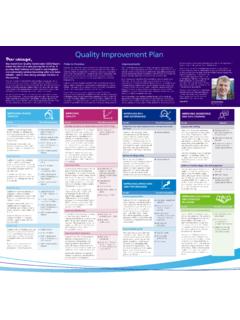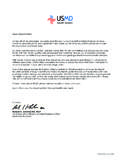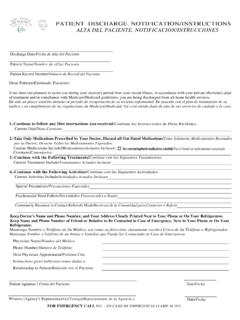Transcription of Spencer H. McCleave, MD, MBA - Hospital Physician
1 Dr. Noble sorts her mail while munching a quick lunchbetween patients . There is the usual junk, some jour-nals, and a letter from a consultant. But one letter islike a punch in the gut. Her eyes widen as she 8 months into practice, Dr. Noble is happywith her working environment. After completing herresidency she joined Community Primary Care As-sociates, one of several group practice options avail-able to her, which is located 15 minutes from herhome. She is pleased with the reimbursement pack-age she arranged, a combination of salary and annu-al bonus, and she likes her coworkers. The director ofthe group has told her she is fitting in well, the teamappreciates her clinical skills, and the businessheadaches are someone else s, although she feels theadministration has listened to the few concerns shehas expressed so far. Best of all, after a few months ofadjustment she is attracting patients who appreciateher warm bedside today her stomach churns as she discovers thata patient has filed a formal complaint against her.
2 Theletter is from Major Metropolitan Health Plan, a man-aged care organization (MCO) that accounts for morethan half the patients seen by the physicians in hergroup. It is signed by a person she does not know,who is identified as a Quality Improvement Advisor. The opening lines sound accusatory: We are chargedwith maintaining the quality of care for our . Dr. Noble s mind races with questions. Howcould this have happened? What should she do? Criticism and allegations are hardly welcomefeedback from patients . But the reality of clin-ical practice is that patients may find reasons tocomplain, despite one s best efforts to provide goodcare. When suddenly faced with a patient complaint, aphysician should be prepared to offer a constructiveresponse and to consider the possibility that the com-plaint, even if not valid, may reveal an opportunity forimprovement. Patient satisfaction plays an importantrole in today s consumer-oriented practice environ-ment [1 3].
3 Thus, it is worthwhile to take appropriatesteps to address problems that may undermine the suc-cess of individual patient encounters as well as the over-all health of one s practice. An angry or unhappy patient occasionally will ap-proach a Physician or office staff member directly and exp-ress dissatisfaction. It is important to be open -mindedwhen a patient voices a concern and to consider that shemay indeed be right. Furthermore, she may have some-thing useful to offer, such as insight into how to commu-nicate more effectively. Addressing the patient s concernappropriately usually does not require great effort and willlikely ensure that the patient leaves happy and thereforewill return. Less commonly, a Physician may receive a formal,written patient complaint through an official third party,such as an MCO that the Physician or group practice hasa contract with or the medical licensing board of the statewhere the Physician practices.
4 Estimating from the vol-ume of formal complaints received in the author s officeand anecdotes from practicing physicians, a typical physi-cian might receive one of these complaints every fewyears. A formal patient complaint by nature is unnervingfor the Physician who receives it and may easily inciteanger, fear, and a defensive response. To put such com-plaints to rest and get on with one s work, a physicianmust be able to respond quickly and effectively. This article focuses on the process typically followedwhen MCOs handle formal written complaints againstindividual physicians in ambulatory practice and offersadvice about writing an effective response without un-due time and effort. The medical literature offers fewresearch findings regarding formal patient complaintsabout physicians. This article, thus, draws heavily fromthe author s experience as a managed care medicaldirector, whose office receives many patient complaintsabout physicians each week and whose work has takenhim inside many MCOs nationwide.
5 Having read hun-dreds of physicians letters, the author shares the ele-ments of a good response that is most likely to resolvethe matter. Although confidentiality constraints pro-hibit reprinting the text of actual patient or physicianVol. 4, No. 2 June 2001 SEMINARS INMEDICALPRACTICE17 PRACTICEBASICSHOW TORESPOND TO AFORMALPATIENTCOMPLAINTS pencer H. mccleave , MD, MBAS pencer H. mccleave , MD, MBA, Medical Director, PatientManagement Department, Aetna Healthcare, Middletown,CT. Dr. mccleave is a family Physician . One of his duties atAetna Healthcare is reviewing and resolving health planmember complaints about physicians. As a former surveyor for theNational Committee for Quality Assurance, Dr. mccleave hasobserved how the formal complaint process works in many orga-nizations across the United , the fictitious scenarios and examples offered aretypical of what the author has seen in actual Formal Patient ComplaintAs Dr.
6 Noble reads the letter (Figure 1), she notes thatshe is asked to respond in 10 days. Attached to the let-ter is a photocopy of the patient s brief, hand-writtencomplaint, which reads as follows:Dear Sir or Madam:I d like to let you know about a bad experienceI had with Dr. Noble, one of the doctors in yournetwork, because I don t think she should beallowed to treat people the way she treated saw her twice, and the first time I went to herI thought she was going to help me. The sec-ond time, I had the feeling she just wouldn t lis-ten to me. I had to talk her into doing an was she supposed to know what waswrong with me without it? What if I had can-cer? I hope you look into this and take this doc-tor off your approved you,Hubert BaxterWhy patients File Formal ComplaintsBased on the author s experience, several factors maymotivate a patient to file a formal complaint against aphysician (Table 1).
7 Most patients raise a legitimateissue from the health care consumer s point of may be well-meaning citizens who sincerelyhope to save someone else from suffering at the handsof a bad doctor. For example, a mother who believesher baby s ear infection was misdiagnosed might com-plain, thinking that the proper authorities can educateor discipline the Physician and prevent another baby sunnecessary suffering. Other patients may want todraw attention to something that could be improved,such as a chilly examination room, just as one mightnotify a hotel about a dripping faucet. Occasionally, apatient may be trying to retaliate, perhaps for a doc-tor s rudeness or failure to research has been done on the subject of whypatients file formal complaints, although some indirectconclusions might be drawn from the literature on pa- tient satisfaction. Several studies have sought to revealreasons for poor patient satisfaction [4 12].
8 It shouldbe noted, however, that the findings from these studiesare quite variable and may not be generalizable to rea-sons for filing formal complaints. Some of the factorsthat have been linked to patient dissatisfaction includeservice problems (eg, difficult encounters or poor com-munication with the provider, rudeness of the officestaff, long wait times) [6,7], unmet patient expecta-tions (eg, tests not done, medications not prescribed,specialty referrals refused, information not provided)[8,11], and patient perception of provider interperson-al behavior [9]. Outpatient service problems are common reasons forformal complaints in the author s experience. In partic-ular, patients often complain about long waits to beseen or alleged rudeness of a provider or office staffmember. The author also has seen many complaint let-ters suggesting the occurrence of a misunderstanding, amiscommunication, or a failure of a Physician to listencarefully enough to understand a patient s true one cannot hope to eliminate complaints bysimply doing whatever patients want.
9 However, strivingfor effective communication is a worthwhile goal for im-proving overall patient satisfaction [13,14] and for avoid-ing the risk of communication breakdown that is sosevere that an angry patient files a malpractice claim [15]. Agencies that Handle Formal ComplaintsIn this article, a formal complaint is distinguished froman informal one by the fact that it comes indirectlyfrom the patient to the Physician , in writing, throughan official third party acting on behalf of the patients may prefer going through a third partyto avoid directly confronting the Physician with a com-plaint, or because a third party may have more cloutthan the patient acting alone. In the author s experience, individuals with gripesabout physicians usually send written complaints toorganizations and officials perceived as having somelegitimacy or authority. Some complaints go to officialswith little direct connection to health care administra-tion, such as the Better Business Bureau, local mayors,congressional or state legislators, nationally prominentpoliticians, and the press.
10 Many of these officials haveno direct authority to investigate and act upon patientcomplaints about physicians, but will follow up as acourtesy to the complainant or because the agency seesits mission as helping to resolve disputes. When sentsomewhere inappropriate, a patient complaint often isredirected to an agency better able to deal with theindividual s immediate concerns. Several agencies familiar to physicians have authorityto investigate and act on formal complaints, includingMCOs, the administrative offices of Physician organ-izations, state licensing boards, and Medicare. A thirdparty s authority depends on what stake it has in the dis-pute, what right or obligation it has to become involved,FORMALPATIENTCOMPLAINTS18 SEMINARS INMEDICALPRACTICEVol. 4, No. 2 June 2001and what relationship it has with the patient and thephysician. The major agencies that routinely handle pa- tient complaints have an obligation to convey the prob-lem to the Physician , to get a response, and to assist inresolving the immediate All MCOs are licensed by the state gov-ernmental department that regulates insurance, andalmost half are accredited by the National Committeefor Quality Assurance (NCQA) [16].







